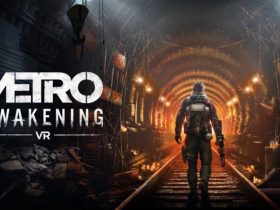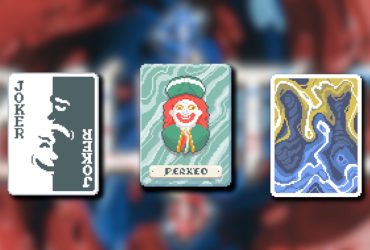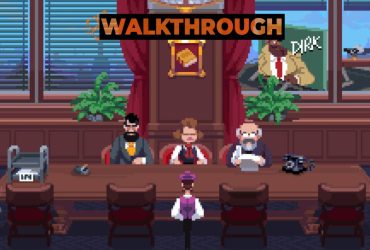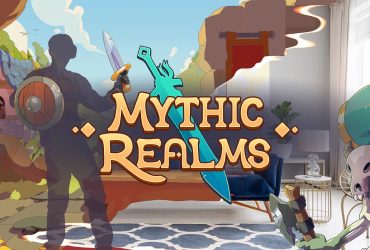Key Takeaways
- Rue Valley is a time loop narrative RPG where you relive the same 47 minutes over and over.
- The game is inspired by Groundhog Day, Spider-Man: Into the Spider-Verse, and Disco Elysium, and features a graphic novel visual style.
- Your personality traits affect gameplay choices and outcomes in the time loop.
47 minutes is all you have in Rue Valley. They’re not real time minutes ticking down as you play, but certain actions progress time forward. But you’ll only ever witness that specific 47 minute window in this world. The same 47 minutes over and over… as you’re stuck in a time loop.
Emotion Spark Studio creative director Marko Smiljanic tells us that Groundhog Day was one of the “biggest inspirations” for Rue Valley. “We tried to grab a few things from it, we even—no, I don’t want to spoil. We have something that is a reference to this movie.” He tells me there are other nods to different movies in the game too, if you can find them in your 47 minutes each time.

Related
The Legend Of Heroes: Trails Through Daybreak 2 Hands-Off Preview – A Spriggan Evolved
The Legend of Heroes: Trails Through Daybreak 2 looks to be an improvement on the first game in almost every way.
I was utterly captivated by Rue Valley as soon as I got my hands on it. The art is slick, stylish, and undeniably impressive, inspired by the 2D parallax art style of Spider-Man: Into the Spider-Verse and Disco Elysium. It opens with a comic book panel-esque menu, clueing you into its aesthetic. Conversations and thoughts take place in pop-up comic book panels. It’s like a living, breathing graphic novel that you can step into and alter events with your decisions.
You’re looping the same 47 minutes and learning from past runs. It almost feels like one of those choose your own adventure novels, only this time, you’re allowed to turn back the pages and get a do-over. It bills itself as an isometric narrative RPG, and also throws point-and-click and adventure tags into the mix on its Steam page. It’s a Disco Elysium comic book. If you’ve played that, you know what it’ll be like. (If you haven’t, you know you really should.)
You take on the role of Harrow, a man sent to a dingy motel in Rue Valley for therapy sessions to deal with his mental health issues. Beyond that, you don’t have much more to go on. In your first 47 minutes, before you realise you’re in a loop, Harrow is afflicted with a total lack of motivation, essentially locking you out from doing most actions. But status effects like these aren’t the only things that affect your actions.
When you start the game, you must assign ability points to define your character across decisional, social, and emotional scales. Once you have two or more points on a scale, you get a trait. Maybe you’re more impulsive than calculated, or you’re more awkward than arrogant. These traits matter, either opening up new actions or denying you from performing specific ones. For example, being indecisive meant I couldn’t tell a cold caller I wasn’t interested and had to go along with the rest of the call.
“You have to choose some of the extremes,” Smiljanic tells me. “You have to spend all the points. Ideally, you would want to be in the middle without any points anywhere like a perfectly balanced person, but there’s no such thing.”
After my short therapy session, a woman was banging a vending machine but I couldn’t speak to her because of my lack of motivation. I then got stuck listening to the receptionist on the phone as I was too awkward to interrupt to ask for my room keys. Afterwards, I unpacked my case, mooched around in my room and received the cold call I couldn’t get out of.
I woke up thirsty, a new status effect that gives an added point to impulsiveness and can only be cured by finding a drink. Later in the evening, three more key events happened. A man reversed his car into a junction box outside the motel, lightning struck the sky causing a brief power outage at the motel, and finally, the whole sky shone bright as if a bomb just went off, seemingly ending the world, and your loop resets.
Smiljanic gives an example of how knowing the time loop events can aid us in future loops. “This thunder causes a power outage in the motel for a few seconds. Everything is fine and nothing special happened, but next time, because we know when the thunder will strike, we can use it to our advantage. If you remember, there’s an electronic key card that opens these doors, so when the power is out, maybe it will just unlock them.”
He also tells us how your personality affects possibilities, telling us about a later part of the game where you must break into a car. If you are reckless, your only option is to smash the window. If you are anything other than reckless, you can use your phone to search for how to get into cars, or go and search in a garage for a key instead.
When you go to sleep, your memory of the events appears in a mind map for you to review, showing what you did and how. After, you’re taken to another screen that holds more mysterious and far more vaguer events that you must interact with. There are intentions you can commit to, but given the lack of motivation, I couldn’t experience it in my preview. It’s clear that Harrow is trying to forget these fragments of memories from beyond what you’ve seen in Rue Valley and no doubt, they’re part of the whole mystery of the game.
In my second loop, Harrow was still grappling with the concept he’d seen all this before, inflicting him with anxious apprehension, and resulting in events changing a little. In my therapy session, my lack of sleep meant the doctor gave me a purple pill. I also chose to cry, and my breakdown meant that when I got to the receptionist, the therapist called her on the other line to let her know, cutting her other conversation short. Win.
This time I fell asleep in my chair, missing the careless driver, but was roused by the sound of thunder. It’s only after this second loop that Harrow faces the fact that he’s stuck in a time loop and you can finally commit to an intention in your mind map to get some motivation. But by the time my next therapy session ended and I was keen to explore more without the lack of motivation afflicting me, the alpha demo was over all too soon.
“Once you fully figure out what’s going on and that you are trapped in a time loop, the game opens up,” Smiljanic says. “You can go further from this motel, up the road, down the road to some other locations, and meet other characters that are trapped in their own figurative loops. You can investigate how they are all interconnected, what happened here, and why time is stuck in this 47 minutes.
“But to do that, you also have to figure out yourself. You’re trying to solve the world ending, but your character also has a problem getting out of bed. You have to first solve your own issues to try to save the world.”
Note: The open alpha for Rue Valley is available from today so you can take your own time loop for a test spin. You can also find out more and wishlist it on Steam here.
The alpha is a tantalising taste of what the full game will be like but leaves you on the cusp of what you know will be a wider range of freedom in the next loop. It’s a very promising sign of what’s to come in Rue Valley, and it’s certainly shot up my list of most anticipated games for 2025.















Leave a Reply